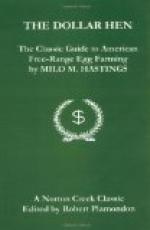No doubt there is well established evidence that some diseases, such as the dread trichinosis, are acquired by the consumption of diseased meat. As far as it is at present known there are no diseases acquired from the consumption of diseased poultry flesh, but, as we do not know as much about the bacteria that infests poultry as we do of that of larger animals, there is no positive proof that such transmission of disease could not occur. Thorough cooking kills all disease germs, and poultry is seldom, if ever, eaten without such preparation.
The idea of protecting people from uncleanly methods of handling their foods, concerning which they cannot themselves know, is somewhat of a sentimental proposition. In practice it amounts to nothing, save as the popular conception of this protection increases the demand for the product which is marked “U.S. Inspected and Passed.”
It may be interesting to some of the reformers of 1906 to know that the meat inspection bill then forced upon Congress by a clamoring public was desired by the packers themselves. Because Congress would not listen to the packers, and the Department of Agriculture, the Chief Executive very kindly indulged in a little conversation with a few reporters, the results of which gave Congress the needed inspiration.
It cost the Government three million dollars to tell the people that their meats are packed in a cleanly manner. If the people want this, it is all well and good. The tax it places upon the price of meat is less than half of one per cent.
A similar inspection of the killing and packing of poultry would involve a very much higher rate of taxation, because of the fact that poultry products are packed in small establishments scattered throughout the entire country.
One reason that the meat packers wanted the United States Inspection, is because it puts out of business the little fellow to whom the Government cannot afford to grant inspection. A few of the very largest poultry packers would like to see poultry inspection for the same reason, but with the business so thoroughly scattered as to render Government inspection so expensive as to be quite impracticable, any such bill would certainly be killed in a congressional committee.
Any practical means to bring about the cleanly handling, and to prevent the consumption of diseased poultry, should certainly be encouraged. This can be done by the education of the consumer. Poultry carcasses should be marketed with head and feet attached and the entrails undrawn. By this precaution the consumer may tell whether the fowl he is buying is male or female, young or old, healthy or diseased. All cold storage poultry should be frozen and should be sold to the consumer in a frozen condition.
I am not in favor of the detailed regulation of business by law, but I do believe that the legal enforcement of these last precautions would be a good thing.




